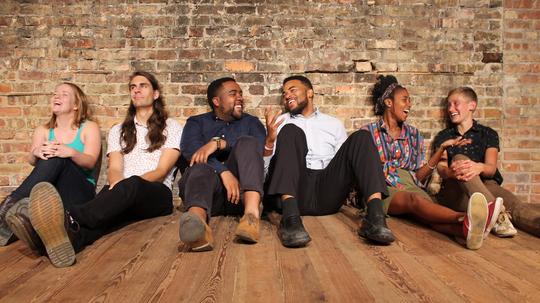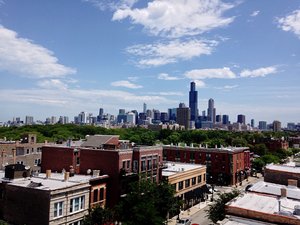
What does nearly 20 years in advertising, an MBA from Northwestern's Kellogg School of Management and several months working out of the University of Chicago's Polsky Center incubator get you?
In John Stoop's case--an improv theater in Hyde Park.
Stoops is the founder of The Revival, an improv theater on 55th street. His goal was to bring the art form of improv--which was created by several University of Chicago students in 1955--back to the South Side. Last November he opened the Revival at the exact location the Compass Players presented theatrical warm up games to a live audience, without rehearsal or extensive script.
However, a lot has changed in the comedy world--and the South Side of Chicago-- since 1955. Improv is now a worldwide phenomenon, with two of the premier theaters (Second City and iO) based in Chicago, but most of the energy around improv only exists on the North Side. Stoops knew that if he wanted to support and grow an improv community South Side once again, he'd have to approach planning and growing the theater in a different way, using his experience in the corporate and business world to create a sustainable product.
"I’m a nontraditional theater owner, or theater person for that matter," he said. "I have every much of a business background as I have a theater background."
So far, the results are promising. A year later, the 150-seat theater has a steady stream of shows and open mics, Stoop employs 20 across the box office, bar, and teaching/training, and he said the theater is profitable. He's created a complementary business teaching improv techniques to elementary schools, law school students, clinical psychologists and more. The hope is that his hybrid model will make the South Side a hub of improv once again.
Stoops was first introduced to improv when he first arrived in Chicago in 1995 for a job at Leo Burnett. The advertising agency offered free Second City classes to employees, to help spur the creative process. Though Stoops said he was “not a drama club kid” he took to improv immediately and continued working with Second City, even moving to Amsterdam for a time to work with Boom Chicago.
A decade later, he went to Kellogg for his MBA and while there he sketched out an idea for an improv theater that would also provide classes and training for businesses and schools. He had early support—his initial business plan won a school competition in 2005—but the recession deterred him from jumping into a high risk venture right out of school. A few years later around his 40th birthday he had the urge to get into theater again.
“You get to a point where there’s a certain type of now or never mindset, and I certainly had that,” he said. He started out in 2013 cofounding the Three Oaks Theater Festival, a seasonal theater in Michigan, then revisited for a South Side improv club in 2014.
His re-entry to performing arts coincided with another change in Hyde Park, where Stoops resides—the Polsky Exchange (then called the Chicago Innovation Exchange) opened on 53rd street and launched an incubator for startups and business ideas from the community. Stoops says he was among the first members, and was accepted to their first incubator cohort in 2015. Though the tech hub wasn't able to offer much advice on the performing arts side, he said it was a valuable experience for the connections and partnerships
"It was more about putting me in front of the right people and making the right introductions to help usher it to reality," he said.
Those connections led to traction on the training side of The Revival's business. They offer eight week classes for kids, teens and adults. A clinical therapist leads a course that combines improv techniques with group therapy, to help people cope with fear and anxiety. The Revival has done workshops with University of Chicago's Booth School of Business and Law School to provide leadership training to students (and UChicago law professor Randall Picker hosted a monthly long form improv show earlier this year). They do off-site workshops with businesses and schools.
This additional revenue stream has been key to keeping the doors open--most theaters have to do more than just ticket sales to stay afloat. "The very nature of a [theater] business requires you to maximize as many streams of revenue as possible," he said.
With one foot in business and one foot in the theater world, Stoops says he sees what each side can learn from the other. Performing arts could learn from tech's focus ("The nature of the tech world demands a laser focus, and to a certain degree every business, not least performing arts businesses, could benefit from that type of approach," he said), while those in tech, on the other hand, can benefit from a lesson in quick, concise thinking that's practiced on stage.
"It is not the core facts of the matter or the business offering or proprietary technology that will determine an individual or company’s success," Stoops said. "It’s also the ability to communicate those points of difference, those key benefits to peers, colleagues, clients and customers."








